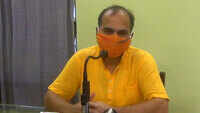
MUMBAI: The maximum arrests made in Mumbai in narcotics cases are of small-time peddlers and those caught for “possession for personal consumption” rather than the main suppliers and big traffickers, according to research by independent think-tank Vidhi Centre for Legal Policy.
The study looked at cases spanning almost a decade. It showed chargesheets in such cases against small-time peddlers and consumers, most of them slum or street dwellers, are filed speedily. And they result in nearly 100% conviction, thus presenting a rosy picture of enforcement in a state which tops in cases under the Narcotic Drugs and Psychotropic Substances (NDPS) Act in India, said the authors.
The study was based on analysis of 839 case orders from a dataset of 10,669 NDPS cases disposed of by magistrate courts in Mumbai until October 1, 2019. Mumbai accounts for over 90% of all arrests and convictions in Maharashtra under the NDPS Act.
The data showed that 97% cases in 2017 and 2018 were for possession for personal consumption. Of cases analysed, 180 mentioned the occupation of the accused. It showed the police almost always arrested those from the lowest strata, mainly daily-wage earners like an AC mechanic, car washer, cook, coolie, ragpicker, auto driver or a delivery boy. In the 10,669 cases analysed, almost all the accused pleaded guilty.
In terms of value, most seizures in Maharashtra are of expensive psychotropic substances, said the report, but “almost every arrest... made under this law has been for cannabis consumption, even though most of the drugs seized are not cannabis-based”. In seeking to curb drug consumption, the law criminalises drug use, often causing harm to the most vulnerable sections of society through penalties and imprisonment, it said. “This is paradoxical, because such criminalisation harms the very people it intends to protect,” the report noted. Courts have the power to send addicts or problematic users to de-addiction centres, but they unquestioningly convict every single person brought before them to prison sentences or fines, said the study.
Ex-ACP Dhanraj Vanjari agreed the criminal justice system makes those most vulnerable subject to arbitrary police action. “To secure a high conviction rate, those found consuming cannabis are picked up, often in the middle of the night, brought immediately before the magistrate, made to plead guilty, convicted and sentenced to minor imprisonment and fines,” he said. Advocate Taraq Sayed, however, pointed out that cases for personal consumption do not always go to trial as the law provides for immunity under section 64 A of NDPS Act provided the accused agrees to treatment for addiction.
The study looked at cases spanning almost a decade. It showed chargesheets in such cases against small-time peddlers and consumers, most of them slum or street dwellers, are filed speedily. And they result in nearly 100% conviction, thus presenting a rosy picture of enforcement in a state which tops in cases under the Narcotic Drugs and Psychotropic Substances (NDPS) Act in India, said the authors.
The study was based on analysis of 839 case orders from a dataset of 10,669 NDPS cases disposed of by magistrate courts in Mumbai until October 1, 2019. Mumbai accounts for over 90% of all arrests and convictions in Maharashtra under the NDPS Act.
The data showed that 97% cases in 2017 and 2018 were for possession for personal consumption. Of cases analysed, 180 mentioned the occupation of the accused. It showed the police almost always arrested those from the lowest strata, mainly daily-wage earners like an AC mechanic, car washer, cook, coolie, ragpicker, auto driver or a delivery boy. In the 10,669 cases analysed, almost all the accused pleaded guilty.
In terms of value, most seizures in Maharashtra are of expensive psychotropic substances, said the report, but “almost every arrest... made under this law has been for cannabis consumption, even though most of the drugs seized are not cannabis-based”. In seeking to curb drug consumption, the law criminalises drug use, often causing harm to the most vulnerable sections of society through penalties and imprisonment, it said. “This is paradoxical, because such criminalisation harms the very people it intends to protect,” the report noted. Courts have the power to send addicts or problematic users to de-addiction centres, but they unquestioningly convict every single person brought before them to prison sentences or fines, said the study.
Ex-ACP Dhanraj Vanjari agreed the criminal justice system makes those most vulnerable subject to arbitrary police action. “To secure a high conviction rate, those found consuming cannabis are picked up, often in the middle of the night, brought immediately before the magistrate, made to plead guilty, convicted and sentenced to minor imprisonment and fines,” he said. Advocate Taraq Sayed, however, pointed out that cases for personal consumption do not always go to trial as the law provides for immunity under section 64 A of NDPS Act provided the accused agrees to treatment for addiction.
Download
The Times of India News App for Latest India News

Coronavirus outbreak
Trending Topics
LATEST VIDEOS
India
 SSR case: Bogus prescription is the reason for filing FIR, says Rhea's lawyer
SSR case: Bogus prescription is the reason for filing FIR, says Rhea's lawyer  LAC row: Both India and China register protest after latest flare-up
LAC row: Both India and China register protest after latest flare-up  Russia approached India for manufacturing, phase 3 studies of Covid-19 vaccine: NITI Aayog
Russia approached India for manufacturing, phase 3 studies of Covid-19 vaccine: NITI Aayog  COVID-19: Maha, AP, Karnataka, UP, TN contribute 62% to active cases, says Health Ministry
COVID-19: Maha, AP, Karnataka, UP, TN contribute 62% to active cases, says Health Ministry  How China intruded in our territory, asks Congress to Centre
How China intruded in our territory, asks Congress to Centre  Encouraged to know Rajnath Singh met Chinese counterpart at SCO: Russian Embassy
Encouraged to know Rajnath Singh met Chinese counterpart at SCO: Russian Embassy
More from TOI
Navbharat Times
Featured Today in Travel
Quick Links
Coronavirus in MumbaiCoronavirus in KolkataCoronavirus in HyderabadCoronavirus in DelhiCoronavirus in BangaloreCoronavirus symptomsCoronavirus in IndiaWhat is CoronavirusCoronavirus NewsSolar EclipseNPRWhat is NRCCAB BillCAB and NRCRTI BillPodcast newsLok SabhaShiv SenaYSRCPCongressBJP newsUIDAIIndian ArmyISRO newsSupreme Court
Get the app



